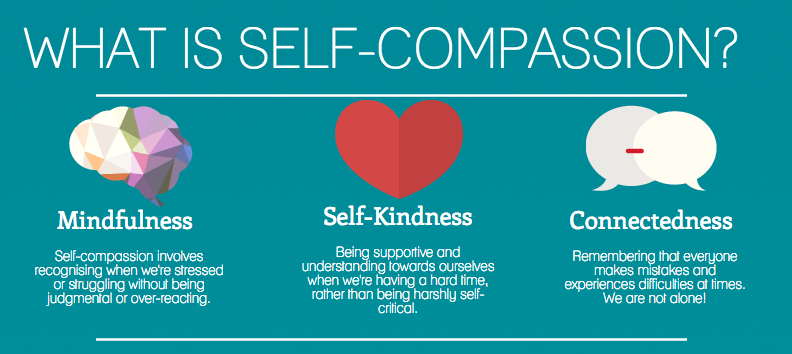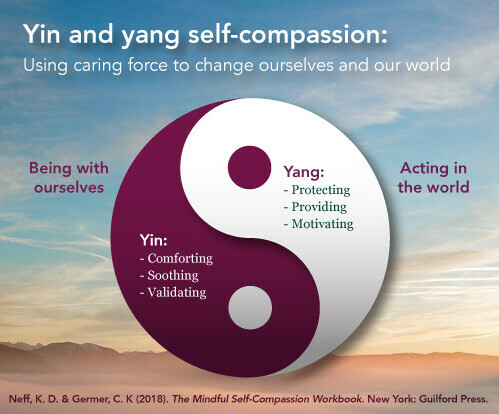Understanding Self-Compassion Meditation
Definition and origins of self-compassion meditation
This blog post is an exploration of the question of what is self compassion meditation and whether self compassion meditation can have an impact on overall wellness.
Self-compassion meditation is a practice that involves directing loving-kindness and compassion towards oneself. It is rooted in the ancient Buddhist tradition of loving-kindness meditation which has been practiced for thousands of years as a way to cultivate compassion and empathy towards oneself and others.
The concept of self-compassion was popularized in the West by psychologist Dr. Kristin Neff, who developed a framework for understanding and practicing self-compassion. According to Neff, self-compassion involves three key components: self-kindness, common humanity and mindfulness.
Self-kindness refers to being gentle and understanding towards oneself especially in the face of failure or suffering. Common humanity emphasizes the idea that all humans experience suffering and imperfection and that it is a natural part of the human experience. Mindfulness involves being aware of one’s thoughts and feelings without judgment and accepting them with kindness and understanding.
Self-compassion meditation draws on these principles to help individuals cultivate a more compassionate and kind relationship with themselves. It has gained popularity in recent years as a way to reduce stress, anxiety and depression and improve overall well-being.
Key components: mindfulness, common humanity, self-kindness
Self-compassion is a vital aspect, and I would venture to say that it lies at the core, of emotional well-being and mental health. It involves being mindful of one’s own feelings and experiences, acknowledging the common humanity of suffering and being kind and understanding towards oneself. Self compassion is, at the same time a contributor to and a reflection of, a healthy and robust self image.
Mindfulness is the practice of being aware of one’s thoughts and feelings without judgment. It allows individuals to observe their emotions and experiences without getting caught up in negative self-talk or self-criticism. Greater self acceptance and sense of self worth almost inevitably flow from a non-judgmental awareness of one’s thoughts and feelings! Common humanity is the recognition that suffering and struggles are a universal part of the human experience that should not open the door to self condemnation or critical self talk.
This understanding can help individuals feel less isolated in their pain and more connected to others. Self-kindness involves treating oneself with the same warmth and care that one would offer to a friend in times of distress! This can involve offering oneself words of encouragement, taking time for self-care activities and being gentle with oneself during difficult times. A further benefit is the avoidance of impulsive emotional reactions and, in so doing, successfully navigate difficult circumstances
Together, these key components of self-compassion can help individuals develop a more positive and nurturing relationship with themselves leading to an enhanced self-image, greater emotional control and resilience and overall well-being.

How to practice self-compassion meditation: a step-by-step guide
Self-compassion meditation is a powerful practice that can help individuals cultivate a sense of kindness and understanding towards themselves. It involves using mindfulness and loving-kindness techniques to develop a more compassionate and caring attitude towards one’s own experiences and struggles.
To begin practicing self-compassion meditation, find a quiet and comfortable place to sit or lie down. Close your eyes and take a few deep breaths to center yourself and bring your attention to the present moment. Next, start by bringing to mind a situation or experience that has caused you distress or suffering. As you reflect on this experience, acknowledge any feelings of pain, sadness or discomfort that arise.
Then, gently remind yourself that it is okay to feel this way and that suffering is a natural part of the human experience. Offer yourself words of kindness and understanding, such as “May I be kind to myself in this moment” or “May I find peace and ease in the midst of my suffering.” Continue to breathe deeply and repeat these phrases to yourself, allowing the feelings of compassion and understanding to grow within you.
If your mind starts to wander or become distracted, gently guide your attention back to the present moment and the practice of self-compassion. As you continue with this meditation, you may find that feelings of warmth, comfort and acceptance begin to arise within you. This is a sign that the practice is working and that you are cultivating a greater sense of self-compassion.
It’s important to remember that self-compassion meditation is a skill that takes time and practice to develop so be patient with yourself and continue to engage in this practice regularly. Over time, you may find that self-compassion becomes a natural and integral part of your daily life leading to greater emotional resilience and sense of well-being.

Incorporating self-compassion into daily routines
Incorporating self-compassion into daily routines is an important practice for maintaining mental and emotional well-being. As I have mentioned, self-compassion involves treating oneself with kindness and understanding, especially in times of struggle or failure. One way to incorporate self-compassion into daily routines is by starting the day with positive affirmations and reminders to be kind to oneself. This can help set the tone for the day and serve as a reminder to approach challenges with self-compassion.
Taking time for self-care activities such as meditation, exercise or engaging in hobbies can also be a way to show oneself compassion. These activities can help reduce stress and promote a sense of greater well-being.
Another way to incorporate self-compassion into daily routines is by practicing mindfulness and being present in the moment.* This can help individuals be more aware of their thoughts and feelings and respond to themselves with kindness and understanding. Incorporating self-compassion into daily routines can lead to improved mental and emotional health and can help individuals navigate life’s challenges with greater resilience and self-acceptance.
Self-Compassion Meditation and Wellness: A Symbiotic Relationship
Exploring the mental health benefits
Self-compassion is an important aspect of mental health that has gained increasing attention in recent years. It refers to the ability to treat oneself with kindness, understanding and acceptance in times of suffering or failure.
Research has shown that individuals who practice self-compassion tend to have lower levels of anxiety, depression and stress as well as higher levels of overall well-being. This is because self-compassion allows individuals to approach their own struggles with a sense of understanding and support, rather than harsh self-criticism. It also helps to foster resilience and the ability to bounce back from setbacks.
Self-compassion has been linked to greater emotional intelligence and healthier relationships, as individuals who are kinder to themselves are often more able to extend that kindness to others. Cultivating self-compassion can have a profound, transformative impact on mental health making it an important area of exploration for both individuals and mental health professionals.

Impact on physical well-being and stress reduction
Research has indicated that individuals who practice self-compassion are more likely to engage in health-promoting behaviors such as exercise, healthy eating and seeking medical care when needed. This in turn can lead to better physical health outcomes, including lower rates of chronic illnesses and better overall functioning.
Self-compassion has also been linked to lower levels of stress and anxiety, as individuals who are able to treat themselves with kindness and understanding are better equipped to cope with life’s challenges.
By reducing the negative impact of stress on the body, self-compassion can contribute to a healthier immune system and lower rates of inflammation, which are linked to a variety of health issues.
A prominent cellular biologist, Dr. Bruce Lipton, asserts that 85% of disease can be linked to negative, defeatist or self-critical patterns of thought. If he is right, perhaps it should not be surprising that the practice of self-compassion has been shown to have a profound impact on physical well-being, making it an important aspect of overall health and wellness.
How self-compassion meditation supports emotional balance
This form of meditation has been found to support emotional balance in a number of ways. Firstly, self-compassion meditation helps individuals to develop a greater sense of self-awareness and acceptance. By acknowledging and validating their own emotions and experiences, individuals can cultivate a more balanced and compassionate relationship with themselves. This can lead to a reduction in negative self-judgment and an increase in self-compassion, which in turn can support emotional well-being.
Self-compassion meditation can also help individuals to regulate their emotions more effectively. By learning to approach their own experiences with kindness and understanding, individuals can develop the skills necessary to confront and navigate challenging emotions in a healthy and balanced way. This can lead to a greater sense of emotional stability and resilience as individuals become better equipped to manage the ups and downs of life.
Furthermore, self-compassion meditation has been found to reduce symptoms of anxiety and depression. By practicing self-compassion, individuals can cultivate a greater sense of inner peace and contentment and avoid the distorted patterns of thought which lead to the symptoms of these common mental health conditions. Self-compassion has been shown to be an effective tool in effectively reducing symptoms of anxiety and depression.
As we have seen, when individuals practice self-compassion, they are able to treat themselves with kindness and understanding rather than harsh self-criticism. This can lead to a decrease in negative thought patterns and a corresponding increase in positive emotions. By being self-compassionate, individuals are able to acknowledge their own suffering and offer themselves the same support and comfort they would offer to a friend in a similar situation. This can help to reduce feelings of isolation and loneliness that often accompany anxiety and depression.
The practice of self-compassion can help individuals to develop a more balanced and realistic perspective on their own struggles, leading to a reduction in the intensity of their symptoms. Research has also shown that self-compassion can lead to an increase in overall well-being and resilience, making it an important tool in managing mental health. Self-compassion meditation is a valuable tool for supporting emotional balance and well-being, and can be a beneficial practice for anyone looking to cultivate a greater sense of self worth and emotional resilience in their lives.

Research findings highlighting the link between self-compassion and wellness
Research findings have consistently highlighted the strong link between self-compassion and overall wellness. Studies have shown that individuals who are able to practice self-compassion tend to have lower levels of stress, anxiety and depression. This is because self-compassion allows individuals to be kind and understanding towards themselves, even in the face of failure or difficulty. This ability to treat oneself with kindness and care has been shown to have a positive impact on mental and emotional well-being.
We have noted that research has also shown that self-compassion is linked to better physical health outcomes as well. Individuals who are able to practice self-compassion tend to engage in healthier behaviors, such as regular exercise, balanced diet and adequate sleep which, in turn, contributes to overall wellness.
Furthermore, self-compassion has been associated with greater resilience and ability to cope with life’s challenges. This means that individuals who are able to practice self-compassion are better equipped to navigate through difficult situations, overcome adversity and bounce back from setbacks. Overall, the research findings on the link between self-compassion and wellness highlight the importance of cultivating self-compassion as a key component of overall well-being.
Building Resilience Through Self-Compassion Meditation
The role of self-compassion in cultivating resilience
Self-compassion plays a crucial role in cultivating resilience, as it involves treating oneself with kindness and understanding in the face of adversity. When individuals practice self-compassion, they are better equipped to bounce back from challenging situations and setbacks.
Research has also shown that individuals who are self-compassionate are more likely to exhibit positive coping strategies and have a greater sense of overall well-being. This is because self-compassion allows individuals to acknowledge their own suffering without judgment and to respond with kindness and care.
By developing a compassionate attitude towards oneself, individuals can build a strong foundation for resilience, enabling them to navigate through difficult times with greater ease and grace. Furthermore, self-compassion can help individuals to develop a more realistic and balanced perspective on their own experiences which, in turn, allows them to approach challenges with greater clarity and emotional stability. In a phrase, cultivating self-compassion is an important ingredient in building resilience and an ability to thrive in the face of adversity.

Strategies for integrating self-compassion into resilience training
Integrating self-compassion into resilience training involves several strategies that can help individuals cultivate a more compassionate mindset. One strategy is to incorporate mindfulness practices such as meditation and deep breathing exercises into resilience training programs.
Resilience training programs are designed to help individuals develop the ability to bounce back from adversity and cope with stress and challenges. These programs often include a combination of cognitive-behavioral techniques, mindfulness practices and stress management strategies. They aim to enhance individuals’ mental toughness, emotional regulation and problem-solving skills.
Resilience training programs can be offered in various settings, such as schools, workplaces and community organizations and are often tailored to meet the specific needs of the participants. Research has shown that participating in resilience training programs can lead to improved well-being, reduced symptoms of anxiety and depression and increased overall resilience. These practices can help individuals become more aware of their thoughts and emotions and develop a greater sense of self-compassion.
Another strategy is to encourage individuals to challenge their inner critic and replace negative self-talk with more compassionate and supportive language. This can be achieved through cognitive-behavioral techniques and positive affirmations. In addition, promoting self-care practices, such as adequate rest, healthy eating and regular exercise, can help individuals build resilience and self-compassion.
Finally, providing opportunities for individuals to connect with others who share similar experiences can foster a sense of belonging and support, which is essential for developing self-compassion. By incorporating these strategies into resilience training, individuals can cultivate a more compassionate and resilient mindset, enabling them to better navigate life’s challenges and setbacks.
Testimonials on the transformative power of self-compassion
Self-compassion has been increasingly recognized as a powerful tool for personal growth and well-being. Testimonials from individuals who have embraced self-compassion as a way of life consistently highlight its transformative impact.
Many people have reported that practicing self-compassion has helped them to overcome negative self-talk, reduce anxiety and depression and improve their overall mental and emotional well-being. By treating themselves with kindness and understanding, they have found that they are better able to cope with life’s challenges and setbacks.
Self-compassion has also been credited with improving relationships, as individuals who are more compassionate towards themselves are also more able to show compassion towards others. Furthermore, self-compassion has been linked to increased resilience and a greater sense of self-worth.
Overall, the testimonials on the transformative power of self-compassion provide compelling evidence of its positive impact on individuals’ lives and serve as a powerful reminder of the importance of being kind and gentle with oneself.

Long-term benefits and sustaining resilience through regular practice
We have already alluded to the research that has shown that cultivating self-compassion can lead to a wide range of long-term benefits, including increased resilience, improved self image and mental health generally speaking as well as a greater overall sense of well-being. By regularly practicing self-compassion, individuals can develop a more positive and realistic self-view, reduce self-criticism and enhance their ability to cope with life’s challenges.
Furthermore, self-compassion has been found to be a key factor in sustaining resilience in the face of adversity, as it provides individuals with the emotional resources and inner strength needed to bounce back from difficult experiences.
Through self-compassion, individuals can learn to be more forgiving and understanding of themselves, which can ultimately lead to a more balanced and fulfilling life. It is important to note that self-compassion is a skill that can be developed and strengthened over time through various techniques such as mindfulness, self-soothing and self-encouragement. By incorporating self-compassion into their daily lives, individuals can build a solid foundation for long-term well-being and resilience ultimately leading to a more fulfilling and meaningful life.

I hope you have enjoyed, and will benefit from, this content that asks the question ‘what is self compassion meditation’. As someone who wrestled with a compromised self image as a youth, this practice has helped me immeasurably. If you have had to come to grips with negative self talk or have been excessively self critical, I hope that you too will experience the benefits of this valuable practice.
If you have questions or comments I’d love to hear from you. Have you had experience with the benefits of self compassion meditation? I invite you to ask any questions, comment or offer your testimonial in the ‘Leave a Reply’ section below.

Grant Rayner
*See post on The Power of Now Part 1 The Power of Now Part 1